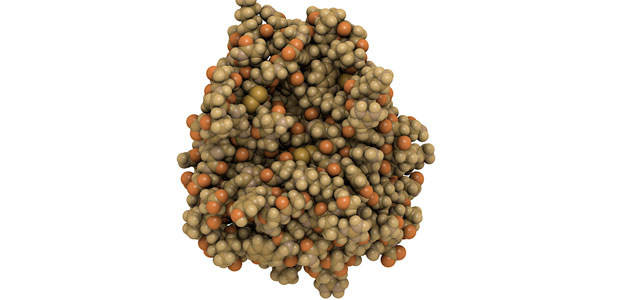Advertisement
Pancreatic Enzymes
Each day the pancreas secretes about 1.7 litres of pancreatic juice in the small intestine. In this juice are enzymes—including lipases, proteases and amylases—required for the digestion and absorption of food. Lipases, along with bile, help digest fats. Deficiency of lipase results in malabsorption of fats and fat-soluble vitamins. Amylases break down starch molecules into … Continued

Each day the pancreas secretes about 1.7 litres of pancreatic juice in the small intestine. In this juice are enzymes—including lipases, proteases and amylases—required for the digestion and absorption of food.
Lipases, along with bile, help digest fats. Deficiency of lipase results in malabsorption of fats and fat-soluble vitamins. Amylases break down starch molecules into more absorbable sugars and are secreted by the salivary glands as well as the pancreas.
The proteases secreted by the pancreas (trypsin, chymotrypsin and carboxypeptidase) break protein molecules into single amino acids.
Incomplete digestion of proteins creates a number of problems for the body, including the development of allergies and the formation of toxic substances produced during putrefaction, the breakdown of protein material by bacteria.
As well as being necessary for protein digestion, the proteases serve several other important functions. The proteases help keep the small intestine free from parasites (including bacteria, yeast and protozoa). A lack of proteases or other digestive secretions greatly increases an individual’s risk of having an intestinal infection, including chronic candida infections of the gastrointestinal tract. Proteases also prevent tissue damage during inflammation, the formation of blood clots and the depositing of immune complexes in body tissues that occurs in such diseases as rheumatoid arthritis and lupus.
Pancreatic Insufficiency
Insufficient output of pancreatic enzymes is associated with abdominal bloating and discomfort, gas, indigestion and the passing of undigested food in the stool. Mild pancreatic insufficiency is thought to be a relatively common condition, especially in the elderly.
Pancreatic insufficiency plays a major role in many cases of food allergies, particularly if a person has multiple allergies. While starch and fat digestion can be carried out satisfactorily without the help of pancreatic enzymes, the proteases are critical to proper protein digestion.
Pancreatic Enzyme Products
Pancreatic enzyme products derived from hog pancreas can treat for pancreatic insufficiency and are also quite popular digestive aids. For vegetarians, bromelain and papain (protein-digesting enzymes from pineapple and papaya, respectively) can substitute for pancreatic enzymes in the treatment of pancreatic insufficiency. These enzyme preparations have also been shown to be effective in helping deal with food allergies.
The dosage of pancreatic enzymes is first based on the level of enzyme activity of the particular product. The United States Pharmacopoeia (USP) has set strict definition for level of activity. This definition is an internationally-recognized standard. A 1X pancreatic enzyme (pancreatin) product has in each milligram not less than 25 units of amylase activity, not less than 2.0 units of lipase activity, and not less than 25 USP units for protease activity. Pancreatin of higher potency is given a whole number multiple indicating its strength.
Full-strength products are preferred because lower potency products are often diluted with salt, lactose, or galactose to achieve desired strength (4X or 1X). The dosage recommendation for a 10X USP pancreatic enzyme product would be 350-700 mg three times a day immediately before meals when used as a digestive aid and 10-20 minutes before meals or on an empty stomach when anti-inflammatory effects are desired.
Make Digestion Easier for Youself
All raw food naturally contains the proper types and proportions of enzymes necessary to digest itself—whether in human consumption or natural decomposition. When raw food is eaten, chewing ruptures the cell membranes and releases the enzymes to begin breakdown.
Food enzymes play an important role in digestion by predigesting food in the stomach before hydrochloric acid has even been secreted. Under optimal conditions, it could be argued that the human body needs no supplementation of enzymes. However, most food enzymes are essentially destroyed at the temperature used to cook and process food, leaving foods devoid of digestive enzyme activity. The body’s digestive process can become overstressed with the full digestive burden and vital nutrients may not be released from food for assimilation.
Plant enzymes work at the pH found in part of the stomach—where food can sit for a while before gastric secretions begin action—and can improve food nutrient utilization. If you decide to supplement with digestive enzymes, read the label. Ingredients could include protease (to break long protein chains into amino acids), lactase (to digest lactose), invertase (to break down sugars), malt diastase (for starches), alpha-galactosidase (for carbohydrates), papaya leaf or papain and fenugreek.




